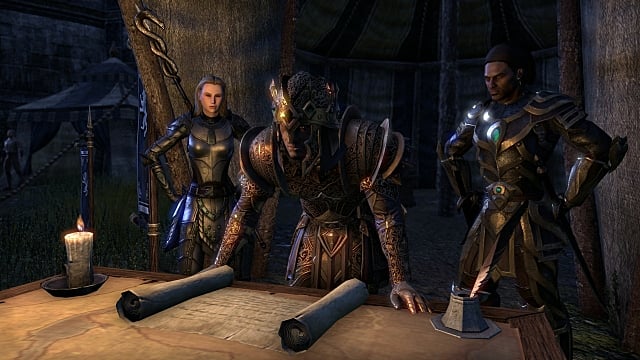Being a jerk isn’t satisfying, but it’s an important part of any sort of leadership position, and one of the things you need to learn how to do. Straddling the line between being an intolerable jerk and being firm when it’s important is a hard thing to learn, so let’s look at learning the first step - learning how to say “no.”
Even when you really want to be able to say “yes” despite that.
Why you need to learn
As an officer, your first job is to make sure that the group you’re leading is the best it can be. That means that you need to be the person who looks at what people want and can be ready to say “no, this is a bad idea.”
Sometimes it’s a transparently bad idea, and sometimes it’s a more subtle one. But your goal is still making sure that the group continues along and remains a comfortable, positive place for everyone. Sometimes that means being the police officer and being willing to look at the long-term costs with a critical eye.
Members - not officers - are not concerned with any sort of overarching vision. They shouldn’t be. It’s important for members of a guild to specifically push those boundaries and nudge the group into new styles, because otherwise the whole group remains a very insular and closed system. But as an officer, you need to be ready to edit things, and you need to be unafraid to put your foot down when you need to.
You shouldn’t want to put your foot down unless you do need to, of course. But you should be willing to do so when you must.
The fears of saying no
There are lots of reasons to fear saying no, but I think the core three are fairly simple: you fear being disliked, you fear making a bad call, and you fear misunderstanding.
Making a bad call is the most obvious of the three, because it’s so easy to do completely by accident. You think you’ve got a handle on what the group as a whole is doing, but then you realize that, say, you rejected an application for someone who would be a major asset to the guild as a whole. Or you agreed to permit a certain behavior in group chat and then realized only after the fact that it has far-reaching impacts that ultimately make other members of the guild feel less welcome and less happy. You worry that once a bad decision is made, it can’t be unmade.
Fearing misunderstanding is pretty straightforward, as well. It cuts both ways - you don’t want to be the person who makes a decision that directly opposes that of another officer, and you don’t want the person to whom you’re saying “no” to misunderstand why you’re saying it. Perhaps you’re saying no to something that another officer said yes to for another member, and that means you’re sending a non-unified message that also damages the sense of group cohesion. That’s not a desirable outcome.
Last but not least, fearing dislike is subtle but also the most important, in some ways. If you’re the officer and no one likes you, no one wants you to remain an officer. Absolutely no one ascends to a position of some prominence with the intent for others to think they’re a jerk. You want to be liked, you want to make the guild better, and if all people see is you roundly denying what they want, you get a reputation. Even if you are absolutely sure that NO is the right thing to say, you might want to make sure that people like you after all.
It’s important to have these fears, though. I’ve seen too many officers discard these fears, and they’re important things to bring along as questions. It’s the difference between examining your options and deciding you’re not wrong and starting out with the assumption that you can do no wrong.
Assuaging the fear
The fear of making a bad call is, oddly, the easiest one to assuage. Yes, you might make a bad call. Your odds of making a bad call increase to near-absolute certainty with enough time. But bad calls are one of those things that can be reversed with time. You can make a decision on Tuesday, find out it was a bad choice on Wednesday, and reverse that decision on Thursday. No, it might not fix everything, but the idea of never saying no because eventually your decision might be wrong is making the same mistake from another angle. Far better to make the bad call and deal with the fallout - or, quite possibly, realize and reverse the decision at a decent clip.
Misunderstanding is a bit harder to assuage, because it is eminently possible to misunderstand something no matter how thoroughly you try to avoid it. You might make a mistake, and your actions themselves might be misunderstood. However, understanding only comes from making a conscious and consistent effort to learn and do better, which means that the solution to this isn’t “saying yes” so much as it is to ask for all of the information ahead of time.
Misunderstandings can also be mitigated by making a point to not make every decision as a snap judgment. It’s perfectly fair to stop an argument unilaterally if you intend to then step in, check out both sides, and do what you can to address underlying issues. Press pause if you need to, even if it’s just for a little bit.
Last but not least, there’s the issue of being liked… and that’s simultaneously the thorniest and least complex issue.
On the one hand, you can’t allow yourself to be pushed into things based on whether or not people will like you. On the other hand, it’s entirely fair for you to say that you want to avoid being disliked if at all possible, and the best you can do for that is explain your thinking and your motivation. Allow members or prospective members to make their case, explain why you’re saying no, and if they disagree with your decision afterward, at a certain point you just have to accept that there’s going to be a disconnect.
You might want everyone to like you, but you can’t make that happen. What you can do is make sure that if they dislike you, they dislike you for the right reasons, and your goals are entirely aimed at making the guild better as a whole. Think about it, but don’t let it stop you from making important decisions.
It should always be hard to say no. Saying no is important, and it should be something undertaken with care. But you should be reluctant to do so, not afraid. And it’s important to understand the difference.
Enjoy the Guild Guide column? Keep up to date with our new Twitter account @GuildGuide!



